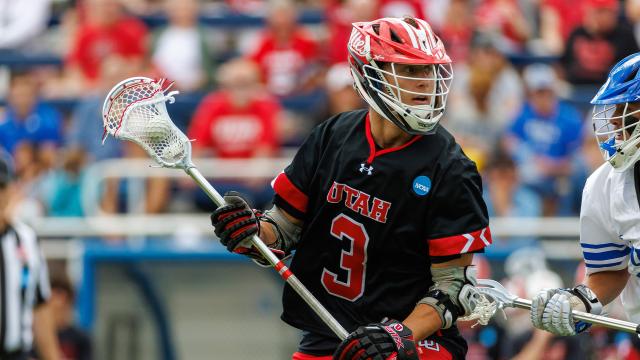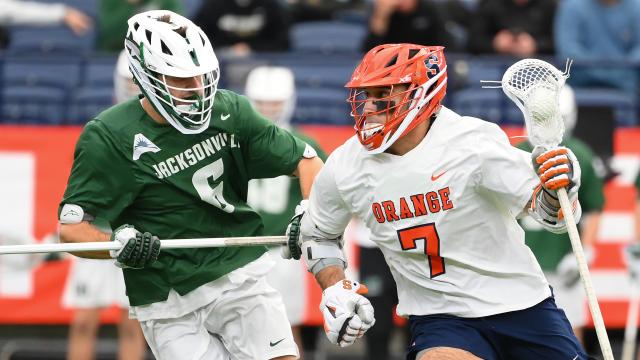
American Boy Fall Brawl Raises Funds for Addicts, Families
Matt Megale dreamed of playing lacrosse at Notre Dame, but a drug addiction sidetracked him and ultimately cost him his life.
Megale was just 26 when he died of a drug overdose in March 2017, one of 70,200 drug overdose victims that year.
“People have come out of the woodwork to want to help,” said Larry Megale, Matt’s dad. “It’s just been heartwarming. I didn’t expect this much right away like this.”
Larry Megale played lacrosse at Virginia, and one of his former teammates, Notre Dame head coach Kevin Corrigan, was quick to help organize the inaugural three-team American Boy Fall Brawl at Centreville High School in Clifton, Va. Notre Dame, Colgate and Princeton each played twice, the teams conducted clinics, and guest speakers addressed the opioid crisis. A similar event is scheduled for this weekend, albeit with four different teams.
“That’s one of the great things about the lacrosse community, the way they rally around a good cause,” Corrigan said. “When this happened with Larry, and Larry and his wife decided they wanted to do this foundation, we talked about doing something and came up with a fall lacrosse event that can draw some awareness to the issue and to the foundation that they’re trying to start.”
Proceeds from the Fall Brawl support scholarships for the American Boy Project that is being launched by the Megale family to combat obstacles to recovery from drug addiction and offer better resources to those swept up in the opioid crisis. The website, americanboy.org, has operated since September 2019 and contains resources for addicts and their families.
“We’ve heard first-hand from the three teams — Notre Dame, Colgate and Princeton. We’ve heard from the families, the alumni, and everyone is excited about this,” Larry Megale said. “Not just the lacrosse games, but just lacrosse being a part of this awareness.”
Larry Megale was reminded of the closeness of the lacrosse community in the wake of his son’s death and with the advent of this event.
“All my UVA teammates have been calling. Guys I haven’t talked to in a while have been checking in,” he said. “As a community, that’s how I learned it growing up, and here it is.”
Megale’s voice trailed as he spoke of the support. It’s been two years, but his he and his wife, Megan, and their daughters, Kelley and Shea, are still mourning.
“It’s hard to think of anything else even though Megan and I work full time and Kelley is working full time on Wall Street and Shea is a full-time student at UVA as well as being an author,” Megale said. “This has come way up in priority.”
The same obstacles that Matt Megale faced in his 10-year battle with addiction are still out there. The family hopes the American Boy Project will raise money to offer treatment scholarships, because the 28-day recovery programs that most insurance companies cover is not long enough, Larry Megale said. They hope to organize a more thorough list of resources for addicts and their families, and they hope to help reduce the stigma of addiction.
“We’re not only raising money for scholarships,” Larry Megale said. “It’s awareness, so people know we’re out here playing to let you know about this crisis that we can’t turn our backs on, because there are people out there in need. It’s pretty much a statement.”
The Fall Brawl coincides with the upcoming November release of the book, “American Boy,” authored by Shea Megale, Matt’s younger sister whom he helped care for. Shea, who was born with spinal muscular atrophy, has written a dozen books and currently is a student at Virginia. Her book title spawned the family’s project and gave a first-hand account of the devastation that they are hoping the Fall Brawl can prevent for other families.
“It was very important to the coaches, and it was good for their players and an education for them,” Larry Megale said. “It came together quickly. I’m surprised how fast we put it together.”
Colgate will face Notre Dame at 10:30 a.m. Sunday. After the game, Timmy Brooks will speak to those in attendance.
Brooks was a high-profile case from Haverford, a suburb of Philadelphia. A Division I prospect, he instead served seven months in jail after selling marijuana to support his own drug addiction that had him admittedly heading down a similar path as Matt Megale.
Brooks has been sober since March 2014, and graduated with honors after capping an All-American career by scoring two fourth-quarter goals in Cabrini’s 16-12 NCAA Division III championship game victory over Amherst in May.
Colgate takes on Princeton in the second game at 12:10 p.m. After that game, Virginia Delegate Tim Hugo — who sponsored a bill named “Amanda’s Law” that would have charged with felony homicide those who made, distributed or gave a deadly dose of Schedule I and Schedule II drugs — will also speak at the event. The bill was vetoed by Virginia governor Ralph Northam in May.
Notre Dame and Princeton wrap up the round robin at 1:50 p.m.
“Just being able to play for an event like that for opioid awareness, it’s special to us,” Princeton coach Matt Madalon said. “I’m sure it’s near and dear to someone in everyone’s program. It’s a really important message. It’s very timely for our young guys.”
According to the NCAA’s 2018 study on the substance abuse habits of college athletes, lacrosse players reported the highest rates of binge drinking, marijuana use and cocaine use.
“I’d be an idiot to say that’s not a part of lacrosse, because that’s a part of what Larry and Megan want to get out to everybody,” Corrigan said. “This is not a poor kids’ problem. It’s not a rich kids’ problem. It’s not a good family problem. It’s not a bad family problem. It’s just a problem.”
“It pretty much cuts across everything, and that’s a part of what their foundation is about,” Corrigan continued. “When it cuts across everybody, there can’t be any stigma, because everybody is vulnerable. And it’s not something you can fix or cure in 30 days. It’s something that really the whole nation needs to understand and get behind that once it’s an issue, it becomes a lifelong issue. There have to be strategies and things in place to allow people to continue to get the help they need.”
The U.S. Centers for Disease Control and Prevention’s National Center for Health Statistics announced in 2018 that the rate of overdoses from fentanyl, now the most commonly used drug in overdoses, has risen 113 percent each year from 2013-2016.
The National Survey on Drug Use and Health estimated that 10.3 Americans misused opioids in 2018. From 2010-2017, heroin overdoses increased five-fold.
In January 2019, for the first time, the National Safety Council announced that there’s a greater chance of dying from an opioid overdose than a vehicle crash in the United States. More Americans die annually from opioid overdose now than gun and motor vehicle accidents combined.
Public awareness campaigns and increased government attention are resulting in some signs of reducing the deadly trend. Preliminary data released by the CDC in July showed a 5.1-percent decline in drug overdoses in 2018, which would be the first annual drop in 25 years. Those results still showed close to 69,000 deaths from opioid overdose, and the crisis is far from over. There are nearly 200 deaths from drug overdoses per day, and the U.S. Department of Health and Human Services published that more than 130 per day were caused by opiate overdoses in 2016 and 2017.
“Everybody knows somebody,” Megale said. “People know of it, people in their family or an acquaintance, but no one is talking about it. It’s a stigma.”
The lacrosse community is addressing some staggering numbers of its own. In addition the binge drinking (69 percent among men’s lacrosse players, 57 percent among women’s lacrosse players) and marijuana (50 percent and 34 percent, respectively) figures, men’s lacrosse had the highest use of narcotic pain medication use, which includes opioids.
Perhaps most shocking is the reported cocaine use in the sport. Twenty-two percent of men’s lacrosse players reported using cocaine at least once in 2017, the highest percentage of all sports by a 15-percent margin.
“Lacrosse is notoriously an alcohol- and drug-use sport,” Madalon said. “That’s unfortunate. It ties into the perception. We talk to our guys about it all the time, about being Division I athletes and being great guys on our campus. Unfortunately, hearing a true heartbreaking story, if it awakens or educates our guys a little more, it’s a job well done.”
Larry Megale is grateful for the lacrosse community’s help in healing. He was a part of the support system 16 years ago when he, Corrigan and other Virginia graduates organized a camp to raise funds for the family of former teammate John Driscoll after he died of a brain tumor. The teammates have stepped up again to address the opioid crisis with the first of what they hope will be an annual American Boy Fall Brawl event.
“It’s certainly much bigger than lacrosse,” Corrigan said. “Anytime we can use lacrosse to highlight an issue or to be part of a solution, it’s great.”
This story was originally published on October 16, 2019, ahead of the inaugural Fall Brawl. After a hiatus due to the COVID-19 pandemic, the Fall Brawl is back with two events in October. For more information, head to americanboy.org.
Justin Feil
Justin Feil grew up in Central PA before lacrosse arrived. He was introduced to the game while covering Bill Tierney and Chris Sailer’s Princeton teams. Feil enjoys writing for several publications, coaching and running and has completed 23 straight Boston Marathons. Feil has contributed to USA Lacrosse Magazine since 2009 and edits the national high school rankings.

Categories
Tags
Related Articles



